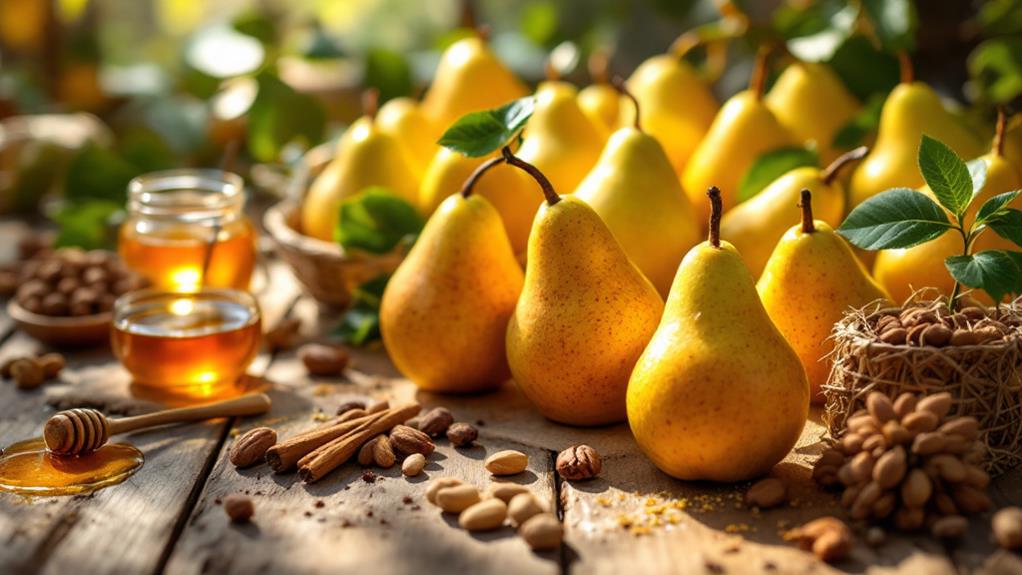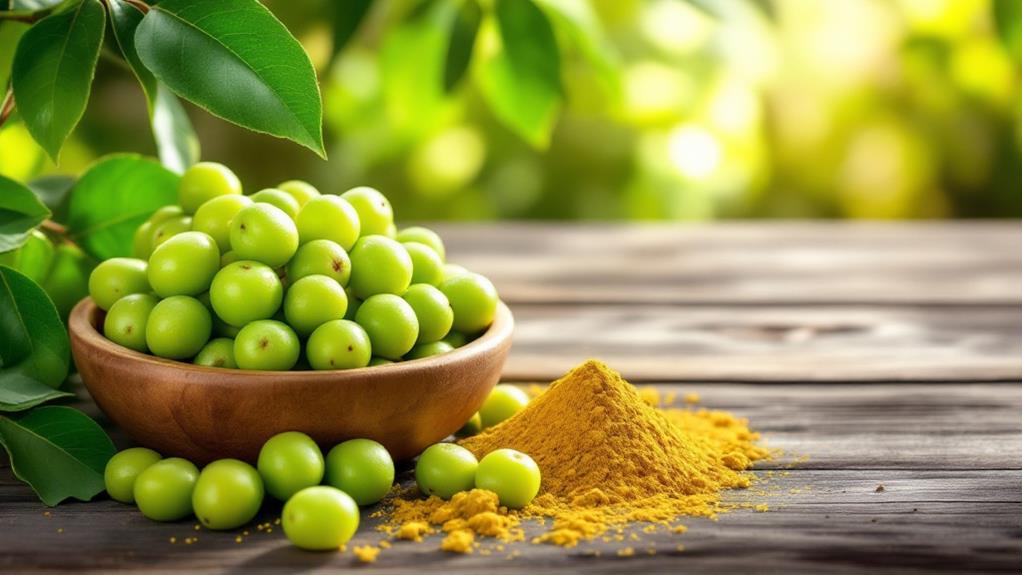A Complete Guide to Oyster Mushrooms: Health Benefits and Culinary Uses
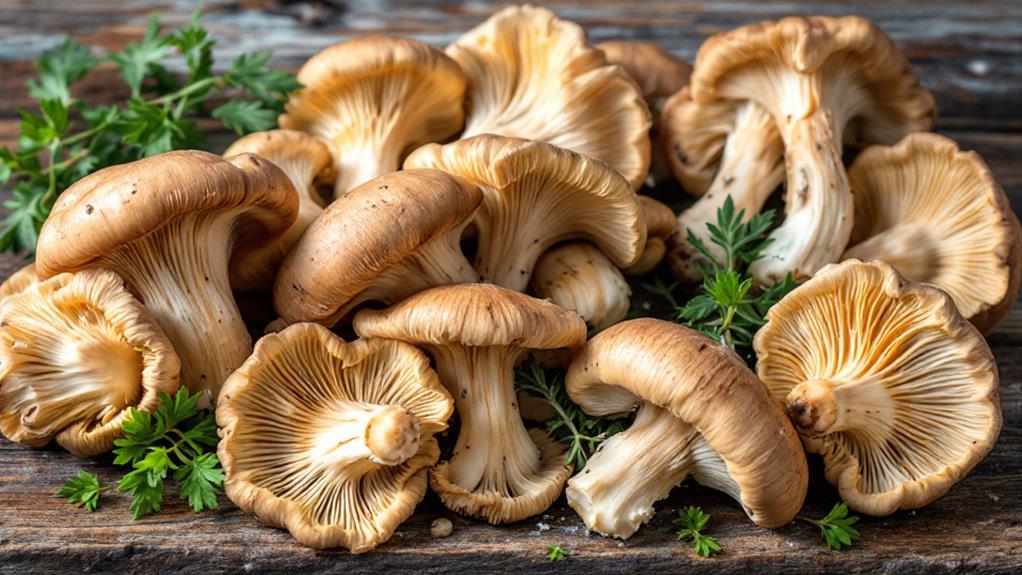
Oyster mushrooms, scientifically known as Pleurotus ostreatus, add a touch of gourmet elegance to your meals while improving your health. These mushrooms are low in calories but rich in protein, fiber, and B vitamins, along with antioxidants like ergothioneine that help combat oxidative stress. They can potentially lower cholesterol and reduce cancer risk by 45%. In the kitchen, you can sauté, grill, or steam them to elevate dishes ranging from stir-fries to soups. They're easy to grow at home and contribute to sustainability through bioremediation. Uncover more about their lively varieties and versatile uses in your culinary adventure.
Understanding Oyster Mushrooms
Oyster mushrooms, scientifically named Pleurotus ostreatus, are fascinating fungi known for their unique oyster-shaped caps and an assortment of colors from white to dark brown. These mushrooms are not only beautiful but also boast a multitude of health benefits. They're remarkably low in calories, with just 28-33 calories per 100 grams, making them an ideal choice if you're watching your caloric intake. Despite being low in calories, oyster mushrooms are rich in protein, fiber, and vital nutrients like potassium and B vitamins, all of which contribute considerably to your diet.
One of the most remarkable health benefits of mushrooms, including oyster mushrooms, is their potential to support your immune system. They contain antioxidants and other compounds that may improve heart health, reduce inflammation, and possibly lower the risk of certain cancers. Their mild and slightly sweet flavor makes them a flexible ingredient, perfect for stir-fries, soups, and sautés, allowing you to incorporate them easily into different dishes.
This thorough guide to oyster mushrooms highlights their dual role as a nutritious and flavorful enhancement to your meals, making them a fantastic choice for both health and culinary enthusiasts alike.
Growing Oyster Mushrooms
Cultivating your own oyster mushrooms at home is a rewarding and straightforward endeavor. Regardless of whether you're a seasoned gardener or a curious beginner, growing oyster mushrooms can be both fun and educational. Initially, choose your substrate. Options include straw, coffee grounds, sawdust, and even cardboard. Each has its own benefits, but all work well for home cultivation.
Start with sterilization to guarantee your chosen substrate is free from competing bacteria and fungi. Boiling, baking, or pressure cooking are effective methods. Once the substrate cools, it's time for inoculation. Mix it with oyster mushroom spawn, which sets the stage for the growth cycle.
Store the inoculated substrate in a dark, warm environment for about two weeks to allow for colonization. After this period, to encourage fruiting, you'll need to adjust the conditions:
- Increase humidity to create an ideal environment for growth.
- Lower temperatures slightly to trigger mushroom development.
- Monitor closely for the initial signs of mushroom formation.
- Maintain consistent humidity levels throughout the fruiting phase.
- Harvest your mushrooms once they reach the desired size and appearance.
Types and Identification
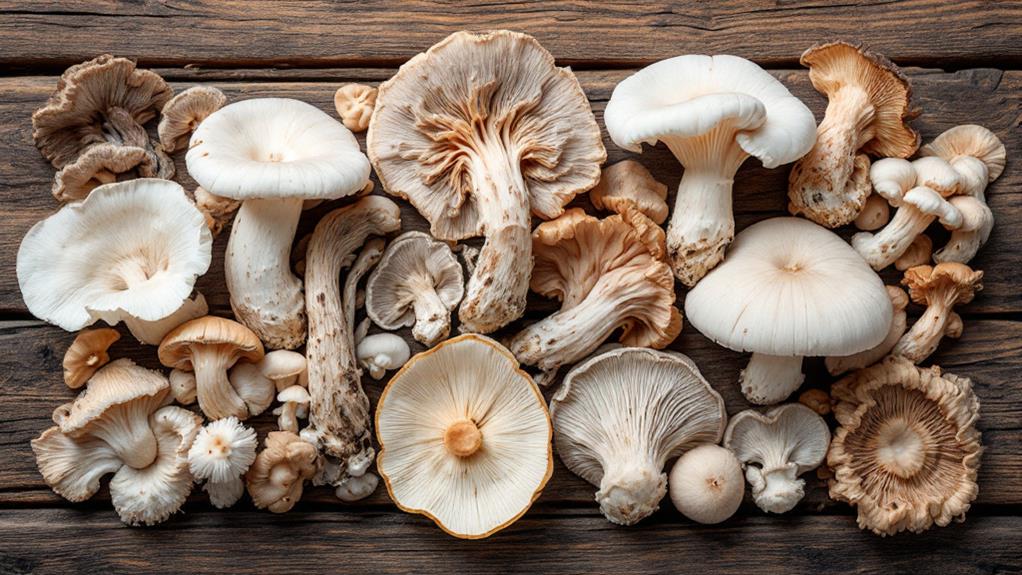
Often celebrated for their adaptability, oyster mushrooms come in several distinct types, each with unique characteristics. When you set out to identify oyster mushrooms, start with the Pearl Oyster, the most commonly cultivated variety. It's recognized by its mild, tender flavor and is often a go-to in different dishes. Then there's the Blue Oyster, known for its robust, earthy taste and striking deep blue hue when young. These types of mushrooms not only add depth to your meals but also offer numerous health benefits.
Exploring further, you'll find the Golden Oyster, which captivates with its bright yellow color and complex flavor profile. The Pink Oyster, with its vivid pink color and woody texture that softens when cooked, adds a splash of color to any dish. King Oyster mushrooms, the largest of the bunch, feature meaty stems and a rich flavor, making them favorites in Mediterranean cuisine.
However, caution is necessary when foraging. Some toxic lookalikes, like the Ghost Fungus and Jack-O-Lantern Mushroom, can cause severe gastrointestinal distress if consumed. Always verify you correctly identify oyster mushrooms before enjoying them.
Nutritional Profile
Exploring the nutritional profile of oyster mushrooms reveals why they're a smart choice for health-conscious individuals. These fungi are not only delicious but also packed with nutrients that can improve your diet. They're incredibly low in calories, with just 28-33 calories per 100 grams, making them ideal for weight management.
Oyster mushrooms offer a balanced mix of macronutrients and crucial vitamins and minerals. Here's what you'll get from a 100-gram serving:
- Protein: Provides 3 grams, supporting muscle health and repair.
- Carbohydrates: Contains 6 grams, offering a steady energy source.
- Dietary Fiber: Delivers 2.3 grams, promoting digestive health.
- Fat: Almost negligible at 0.4 grams, beneficial for low-fat diets.
- Potassium: High content at 420 milligrams, aiding cardiovascular health.
These mushrooms also contain unique compounds like ergothioneine and beta-glucans, known for their antioxidant properties. These compounds contribute to the health benefits of oyster mushrooms by potentially lowering cholesterol and improving immune function. Including oyster mushrooms in your meals not only enhances flavor but also enriches your diet with important nutrients. They're a fantastic supplement to any meal plan, offering both taste and nutritional advantages.
Health Advantages
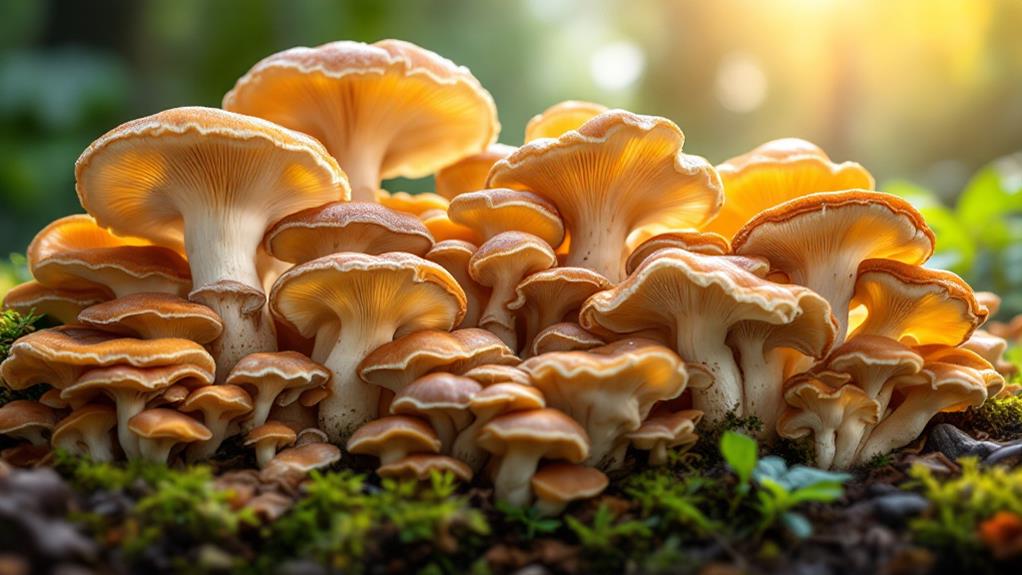
Oyster mushrooms pack a punch regarding health advantages, making them a superb improvement to your diet. They're not just low in calories, with about 28-33 calories per 100-gram serving, but they also deliver key nutrients that support your comprehensive well-being. You'll find 3 grams of protein and 2.3 grams of dietary fiber, which contribute to a balanced diet. Plus, oyster mushrooms are rich in B vitamins and potassium, vital for maintaining energy levels and nerve function.
When it comes to combating oxidative stress, oyster mushrooms shine with their high levels of antioxidants like ergothioneine and glutathione. These antioxidants help protect your cells from damage, promoting long-term health benefits. Studies suggest that regularly consuming oyster mushrooms can lower cholesterol levels, supporting heart health. They also aid in diabetes management by regulating blood sugar levels, making them a smart choice if you're watching your glucose intake.
Incorporating oyster mushrooms into your diet might also reduce your risk of certain cancers, with studies indicating a potential 45% decrease in risk with daily intake. Adopt oyster mushrooms for their impressive health benefits and enjoy a healthier lifestyle.
Culinary Applications
In the culinary world, oyster mushrooms are celebrated for their sweet, delicate flavor that improves a variety of dishes. These versatile fungi amplify cuisines such as Chinese, Japanese, and Korean, thanks to their ability to absorb flavors and contribute a unique depth. When you cook oyster mushrooms, they develop a meaty texture, making them a fantastic meat substitute for vegetarian and vegan dishes. As a healthy enhancement to your meals, oyster mushrooms contain high levels of protein and fiber.
You'll find that these delicious oyster mushrooms are perfect for:
- Stir-fries, where their flavor melds beautifully with soy sauce and vegetables.
- Pasta dishes, adding a savory element and nutritional increase.
- Soups, giving them a hearty consistency and rich taste.
- Grilled toppings for salads or sandwiches, providing a delightful texture.
- Sautéed sides, quickly highlighting their natural, sweet taste.
Remember that mushrooms have decurrent gills, which aid in their distinct appearance and cooking properties. For peak freshness, store them in a paper bag in the refrigerator and avoid washing until just before use to prevent sogginess. Incorporate these delicious oyster mushrooms into your meals for an improved culinary experience.
Cooking Techniques
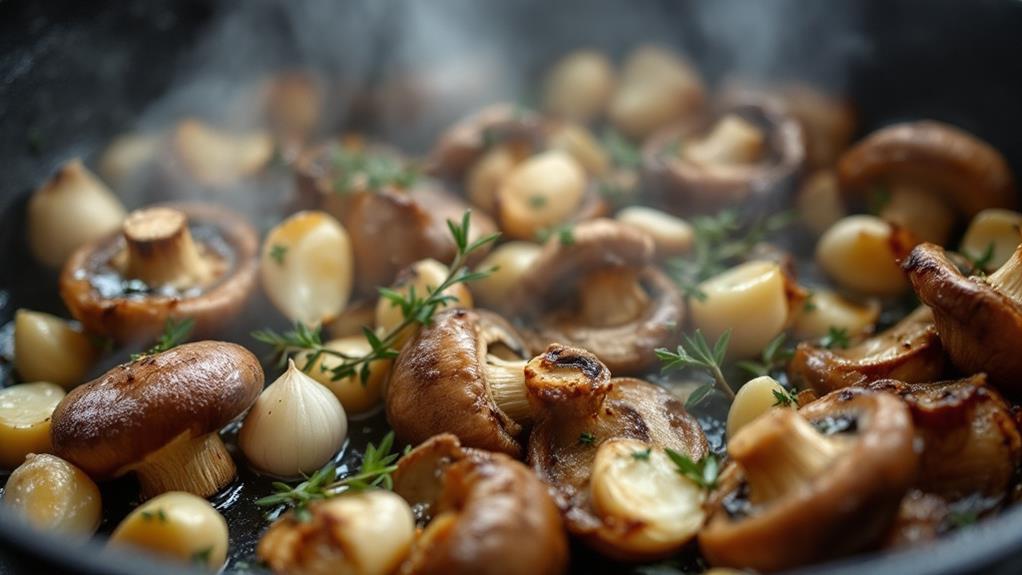
As far as cooking techniques for oyster mushrooms are concerned, their flexibility in the kitchen truly shines. You can quickly sauté them over medium heat with a bit of oil to improve their natural flavor, keeping their texture tender and savory. Just be sure not to overcrowd the pan during stir-frying, or you'll end up steaming them, leading to soggy mushrooms instead of achieving that delightful caramelization.
Grilling oyster mushrooms is another fantastic option. By brushing them with olive oil and seasoning them lightly, you can bring out a smoky flavor. Place them on the grill for a few minutes on each side until they're perfectly cooked. This method highlights their meaty texture and amplifies the umami flavor that makes them so beloved.
Oyster mushrooms are also a superb supplement to soups and stews. They enrich the broth and add depth, making them a popular choice in different cuisines. Their umami flavor infuses the dish, creating a hearty and satisfying meal. Remember, for ideal taste and digestion, it's best to cook oyster mushrooms initially, as consuming them raw could lead to a metallic taste and digestive discomfort.
Storage and Preservation
After mastering the art of cooking oyster mushrooms, it's important to know how to store and preserve them to maintain their freshness and flavor. Proper storage and preservation techniques not only improve the quality but also extend the longevity of these versatile fungi. Start by selecting firm, blemish-free clusters to guarantee you're getting the best quality.
For storing fresh oyster mushrooms, follow these steps:
- Refrigeration: Place them in a paper bag before refrigerating. This allows air circulation and prevents moisture buildup, which can lead to spoilage.
- Freezing: For longer-term storage, briefly boil the mushrooms for 3 minutes, rinse, drain, and then seal them in freezer bags.
- Dehydration: Slice and bake the mushrooms at 150°F until completely dry, turning them into dried mushrooms that last several months.
- Inspection: Always check for wilting or dark spots before storing to maintain quality.
- Shelf Life: Fresh mushrooms can last 5-7 days in the refrigerator when stored properly.
Environmental Impact
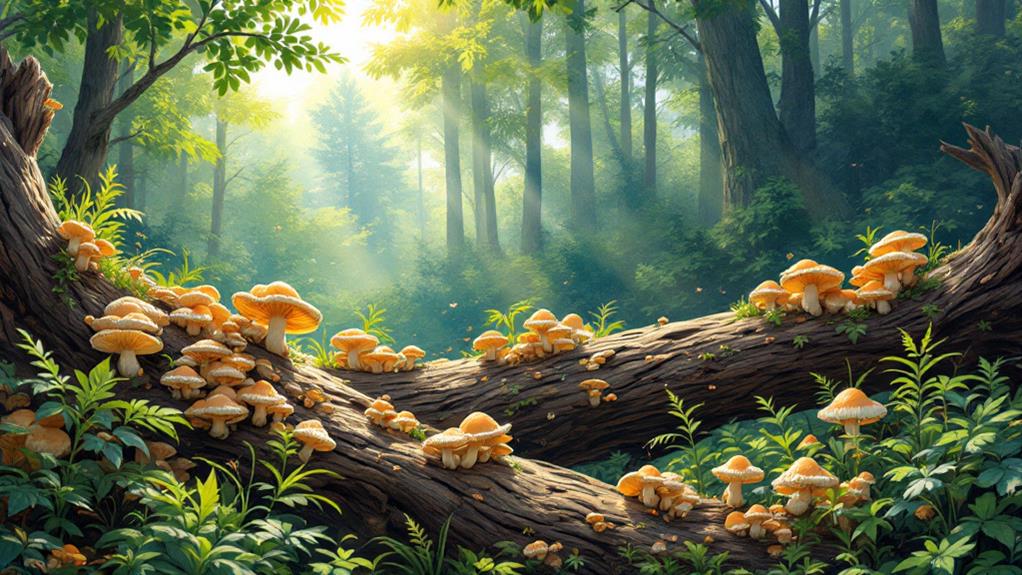
Oyster mushrooms offer a remarkable ecological advantage due to their ability to naturally detoxify environments. Their mycelium can break down pollutants and absorb heavy metals, making them a powerful tool for bioremediation. This means you can use them to help clean up contaminated areas, returning health to the ecosystem. They decompose dead wood, recycling nutrients back into the soil, which supports the growth of other plants and promotes forest health. By doing this, oyster mushrooms improve the overall well-being of ecosystems and contribute to biodiversity.
Growing oyster mushrooms is environmentally friendly, using considerably less water and land compared to traditional livestock farming. This reduces their carbon footprint, making them a sustainable choice. You can cultivate them on agricultural waste, like straw and coffee grounds, which not only minimizes waste but also supports sustainable farming practices. By using these waste materials, you're participating in an efficient nutrient recycling process that benefits the environment.
Additionally, oyster mushrooms are a key part of the food web, providing nourishment for diverse wildlife. This role helps maintain ecological balance and encourages biodiversity in their natural habitats, showcasing their environmental importance.
Fun and Interesting Facts
Among the fascinating aspects of oyster mushrooms is their unique ability to digest nematodes, showcasing one of the few instances of carnivorous behavior in fungi. This intriguing trait adds to their allure as one of the most versatile edible fungi. Not only do they offer numerous health benefits, but they also present exciting culinary uses. Did you know that King Oyster mushrooms, the largest type, can grow up to 12 inches tall, boasting a meaty texture perfect for hearty dishes?
Here are some fun facts that highlight the remarkable nature of oyster mushrooms:
- Bioremediation Powerhouse: Their mycelium can break down pollutants and absorb heavy metals like mercury, aiding in environmental cleanup.
- Historical Roots: They were initially cultivated in Germany during World War I to combat food shortages.
- Diverse Species: With over 20 species, including the colorful blue oysters, they're a feast for both the eyes and palate.
- Culinary Versatility: Their varied flavors make them perfect for everything from stir-fries to soups.
- Easy to Cultivate: They're popular among home growers due to their adaptability and quick growth.
These fun facts reinforce the extraordinary qualities of oyster mushrooms in both health and culinary contexts.



